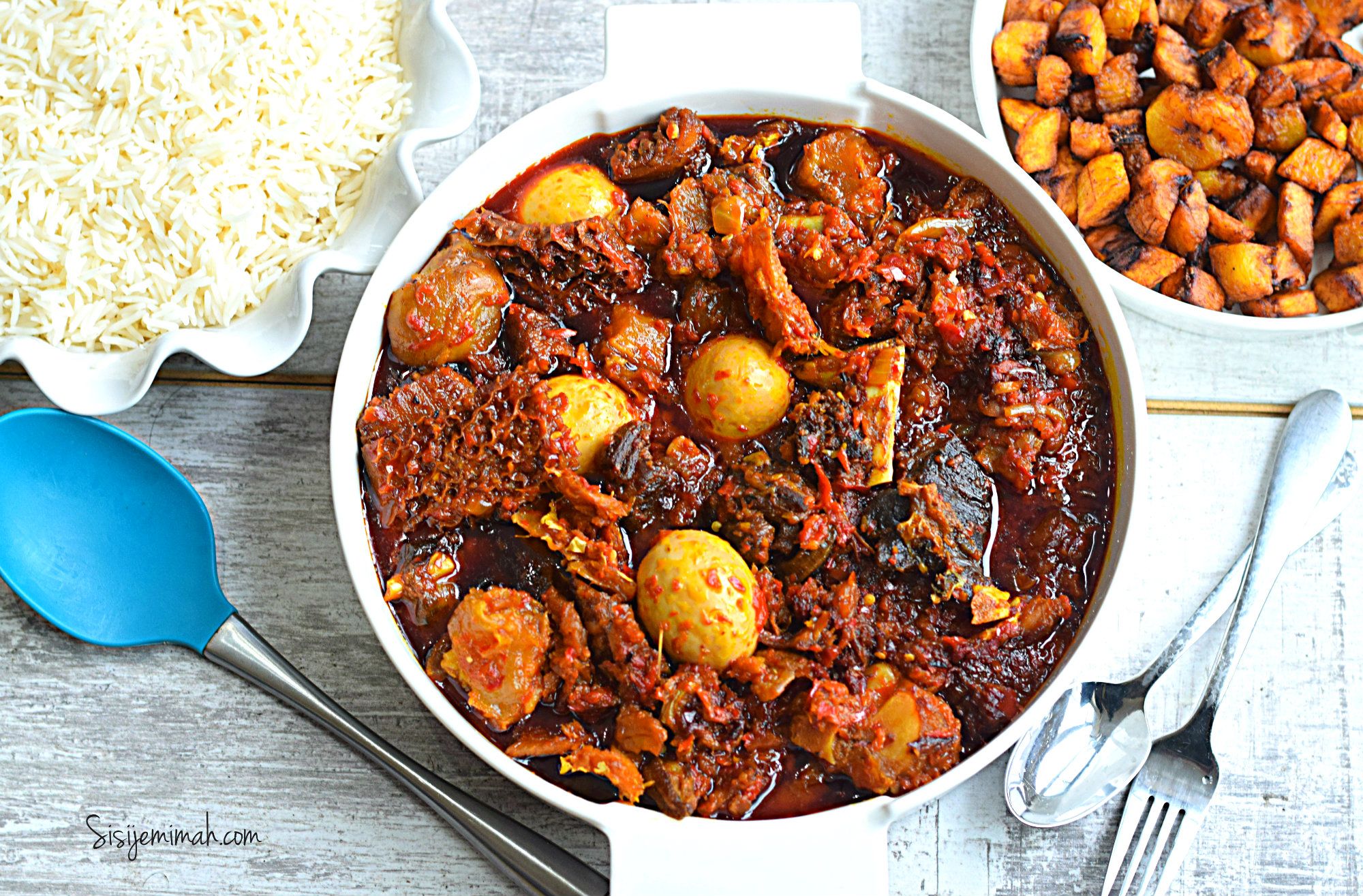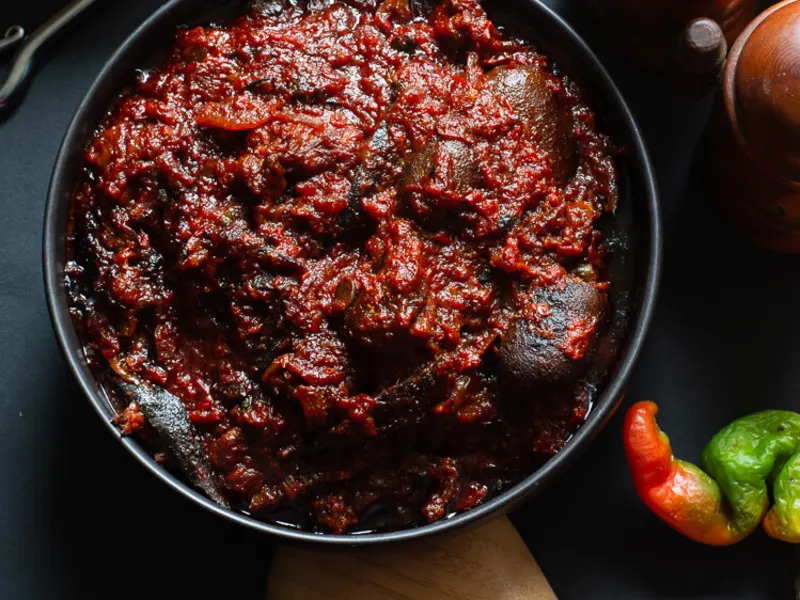Ofada Stew: The Rich and Spicy Delight of Nigerian Cuisine

Nigerian cuisine is known for its vibrant flavors, unique ingredients, and diverse regional dishes. One such mouthwatering delight that captures the essence of Nigerian cooking is Ofada stew.
Also referred to as Ayamase or Designer stew, Ofada stew is a traditional Nigerian delicacy hailing from the western region of the country.
This rich and spicy dish is deeply rooted in Yoruba culture and has gained popularity across Nigeria and beyond.
Let’s delve into the world of Ofada stew and discover what makes it so special.
Origins and Ingredients
Ofada stew takes its name from the indigenous rice variety, Ofada rice, which is traditionally served alongside the stew. The rice is locally grown and possesses a distinct aroma and chewy texture.
The stew itself is made with a blend of assorted green peppers, onions, palm oil, locust beans (iru), crayfish, and a variety of meats such as beef, offal, and smoked fish.
The use of local ingredients gives Ofada stew its unique flavor profile.
Preparation and Cooking Process
The preparation of Ofada stew involves a meticulous process to extract its rich flavors. First, the peppers are roasted or boiled, then blended with onions and locust beans to create a spicy and aromatic base.
The palm oil, which is a key component of the stew, is bleached to remove its inherent bitterness and then added to the pepper mixture. This step gives the stew its distinctive red color and enhances its overall taste.
Next, the meat is parboiled separately and combined with the pepper mixture. The stew is then allowed to simmer slowly, allowing the flavors to meld together and infuse the meats.
Finally, the crayfish and smoked fish are added to the pot, adding depth and a delightful smoky undertone to the stew.
Taste and Serving
Ofada stew is renowned for its robust and complex flavors. The blend of spices, including peppers, onions, and locust beans, creates a fiery and aromatic sauce.
The palm oil imparts a rich and silky texture, elevating the overall taste of the stew. The meats, cooked to perfection, become tender and succulent, absorbing the flavors of the stew.
Ofada stew is traditionally served with Ofada rice, a local parboiled rice variety with a distinct nutty flavor.
The combination of the spicy stew and chewy rice creates a harmony of tastes and textures. To enhance the meal, assorted garnishes such as boiled eggs, fried plantains, and avocado slices are often added.
This colorful ensemble of flavors and presentations makes Ofada stew a visual and culinary delight.
Cultural Significance
Beyond its gastronomic appeal, Ofada stew holds significant cultural importance in Nigeria. It is often served at weddings, festive occasions, and family gatherings, symbolizing unity and shared experiences.
The process of preparing and enjoying Ofada stew fosters a sense of community, as families and friends gather to participate in the cooking and savor the meal together.
Recipe

Let’s go through the authentic recipe for Ofada stew, allowing you to recreate this tantalizing delicacy in your own kitchen.
Ingredients:
To prepare Ofada stew, you will need the following ingredients:
- 1 kg assorted meats (beef, tripe, cow skin), cut into bite-sized pieces
- 500 g smoked fish (mackerel or catfish), deboned and flaked
- 2 cups palm oil
- 3 cups assorted green peppers (bell peppers and habanero peppers), roughly chopped
- 2 medium onions, finely chopped
- 3 tablespoons locust beans (iru)
- 2 tablespoons ground crayfish
- Bigmama Goat flavour
- Salt (to taste)
Instructions:
1. Preparing the Meats:
- Rinse the assorted meats thoroughly under running water.
- Place the meats in a large pot and add enough water to cover them.
- Season with salt and seasoning cubes or powder.
- Boil and simmer until the meats are partially cooked (about 20 minutes).
- Drain and set aside.
2. Preparing the Pepper Base:
- In a blender or food processor, combine the assorted green peppers and one chopped onion.
- Blend until you achieve a coarse texture. Avoid making a smooth paste; some texture is desired for the stew.
- Set the pepper mixture aside.
3. Preparing the Palm Oil:
- Heat the palm oil in a separate large pot or saucepan on medium heat.
- Allow the palm oil to heat up for a few minutes until it becomes translucent and loses its raw taste.
- Be cautious as the oil can splatter during this process.
4. Creating the Flavors:
- Add the remaining chopped onion to the heated palm oil and sauté until it becomes translucent.
- Add the locust beans (iru) to the pot and sauté for a couple of minutes to release its flavors.
- Pour in the pepper mixture and stir well.
- Cook the pepper base for about 10-15 minutes, stirring occasionally to prevent burning.
5. Combining the Ingredients:
- Add the partially cooked assorted meats to the pot with the pepper base.
- Stir to ensure the meats are well coated with the sauce.
- Cover the pot and allow the stew to simmer on low heat for approximately 45 minutes to 1 hour, or until the meats are tender.
6. Final Touches:
- Gently add the flaked smoked fish and ground crayfish to the stew.
- Stir to incorporate the ingredients, being careful not to break the fish into small pieces.
- Adjust the seasoning by adding more salt and/or seasoning cubes if needed.
- Allow the stew to simmer for an additional 10-15 minutes to allow the flavors to meld together.
Serving
Ofada stew is traditionally served with Ofada rice, a local parboiled rice variety. The combination of the spicy stew and the chewy Ofada rice creates a perfect balance of flavors and textures.
Garnish the stew with boiled eggs, fried plantains, and avocado slices for an added touch of color and taste.
Conclusion
Ofada stew represents the rich tapestry of Nigerian cuisine, bringing together a diverse array of flavors, ingredients, and traditions.
This iconic dish showcases the country’s culinary heritage, and its popularity has transcended regional boundaries, becoming a favorite across Nigeria and beyond.
With its tantalizing blend of spices, succulent meats, and distinctive Ofada rice, Ofada stew offers a truly authentic and unforgettable culinary experience.
So, the next time you’re exploring Nigerian cuisine, don’t miss the chance to savor the bold and flavorful Ofada stew.
Comments are closed.

One Comment